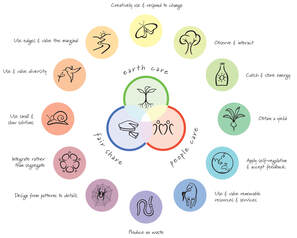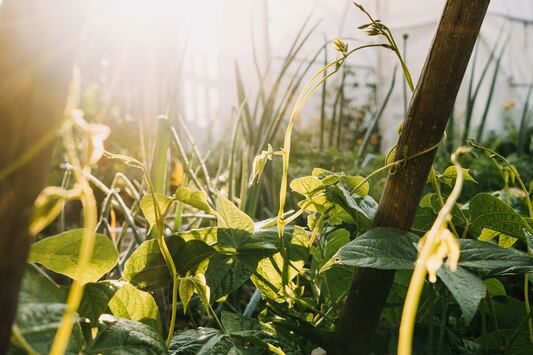|
by Colette Hehle Permaculture denotes a set of principles by which earth-lovers design sustainable, organic farms and gardens. The word can be broken down as “permanent cultivation” or “permanent agriculture” to refer to its use of perennial plants and slow, long-term solutions, but it can also imply a philosophy of life: an attempt at designing a “permanent culture.” Although not defined by Bill Morrison and David Holmgren as “permaculture” until the 1970’s, these practices draw on organic and indigenous farming techniques from across the globe—and on patterns found within God’s original design plan for creation itself. Permaculture represents a space of unity among diversity. The descriptions of creation in Genesis 1 and 2 make it clear that God designed not only humanity, but also the whole universe. “All the wild birds are mine, and all living things in the fields” (Psalm 50:11), says the Psalmist regarding our Creator. Indeed, humanity was the last to be created, illustrating our dependence on the creation that precedes us: the light, the water, the earth, the Spirit.
“Christian permaculture” could, I think, provide a blueprint for how we create our world. Seeing that life grows particularly strong at the edges of forests and ponds, we in the permaculture community garden—and live--paying special attention to what’s at the margins. With plants and with people, that’s where change often starts. People of color, those of low socio-economic status, and other marginalized groups are the first to suffer the effects of climate change, food deserts, and pollution, and they must be the first on our hearts when we seek to address those issues. We follow their leadership and listen to their testimonials, for world-changing truth is found in these spaces. We value diversity of life, as seen in all natural groves, forests, and fields. Our gardens contain variety, and we seek to create the same diversity in our families, friend-groups, and workplaces. In both worlds of both plant and human, diversity strengthens us to withstand many challenges by offering multiple solutions. A taller plant can shade a smaller one, while the small plant produces nitrogen that feeds the taller one. Similarly people, equipped with different life experiences, can protect and enrich one another with different solutions to problems.
Job may as well be describing permaculture when he tells his friends: “But ask the animals what they think – let them teach you; let the birds tell you what’s going on. Put your ear to the earth – learn the basics. Listen – the fish in the ocean will tell you their stories. Isn’t it clear that they all know and agree that God is sovereign, that he holds all things in his hand?” (MSG, Job 12:7-12 ). This passage shows the reliability and wisdom of the natural world to deliver a blueprint for God’s intents and purposes—“the basics” through which life can flourish. Through careful, prayerful discernment, the Christian permaculture designer mimics the practices of God acting in nature; thus we honor and sustain the life over which God gave us stewardship. Let us conclude by remembering that, in Genesis 1:28, “dominion” does not imply the unrelenting exploitation that we as a species have enacted upon the world. Perhaps, as in some versions of the Bible, this word might be better translated as “stewardship.” Regardless, Genesis also tells us that we were created in the “image” (Genesis 1:27) of God. We should, therefore, follow God’s ways, offering justice, mercy, and love to the sacred creation which, in turn, provides our own sustenance. God decrees that we come forth from the earth, live on it, and return to it in the end. In every stage of that journey, our existence is contingent on the living planet we call home. Bring permaculture to life for yourself today. Plant a sustainable garden, or plant the seeds of hope in a community through advocacy and non-profit work. Cook a healthy, sustainable meal for your family, reduce your household’s energy consumption, or harness waste through composting. There are so many ways to bring permaculture–and Christian spirituality–into one’s daily life. It might be surprising how often the two align!
0 Comments
Your comment will be posted after it is approved.
Leave a Reply. |
About this BlogThis blog shares the activities of Creation Justice Ministries. We educate and equip Christians to protect, restore, and rightly share God's creation. Archives
July 2024
Categories
All
|
Photo from johndillon77



 RSS Feed
RSS Feed